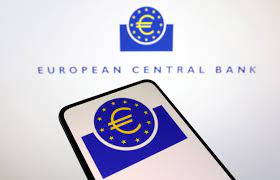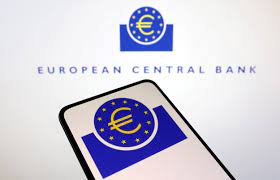
According to a source on Friday, after U.S. lenders gave First Republic Bank a $30 billion lifeline and drew record amounts from the Federal Reserve, supervisors at the European Central Bank do not see any spillover effects from recent sector turmoil for euro zone banks.
The San Francisco-based lender was caught up in market turbulence brought on by the failure of two other mid-size US banks on Thursday, and large US banks swooped in to save it.
Shortly after Credit Suisse, which was in trouble, requested an emergency central bank loan of up to $54 billion to support its liquidity, the rescue package was announced.
Despite the action, shares of Switzerland's second-largest bank continued to decline on Friday, with First Republic's shares showing a 12% decline in U.S. pre-market trading.
In an unusual move ahead of one scheduled for next week, the ECB held an ad hoc supervisory board meeting, its second this week, to discuss the strains and volatility in the banking sector.
According to a source familiar with the meeting's discussion, the supervisors did not perceive any spread of the market turmoil to euro zone banks, and they were informed that deposits were stable across the industry and that the exposure to Credit Suisse was insignificant.
There were no comments available from the ECB.
According to central bank data released on Friday, banks in the euro zone are still holding $4.25 trillion worth of excess liquidity that they are eager to return to the ECB now that borrowing from it is more expensive.
During a routine news briefing, a German government spokesperson stated that the current state of European banks is not comparable to the financial crisis of 2008 and that there is no reason to be concerned about the nation's banking sector.
Since Silicon Valley Bank failed last week as a result of bond-related losses that mounted when interest rates spiked the previous year, concerns about what else might be lurking in the larger financial system have caused banking stocks to decline globally.
Analysts and investors are still concerned about the possibility of a full-blown banking crisis, despite the fact that the two deals and the decision by policymakers have helped to restore some calm.
According to data released on Thursday, banks in the United States have recently requested record amounts of emergency liquidity from the Fed, expanding the size of the central bank's balance sheet after months of contraction, underscoring the severity of the situation.
According to a source with knowledge of the matter, influential figures like Jamie Dimon, CEO of JP Morgan, Jerome Powell, Chairman of the Federal Reserve, and U.S. Treasury Secretary Janet Yellen put together the First Republic deal.
"They will keep the money in First Republic to keep it alive for self interest ... to stop the run on banks. Then they will take it away gradually and the bank will play out a slow death," Mathan Somasundaram, founder at research firm Deep Data Analytics in Sydney, said on Friday.
According to a statement from the banks, the rescue involved some of the biggest names in U.S. banking, including JP Morgan Chase & Co, Citigroup Inc, Bank of America Corp, Wells Fargo & Co, Goldman Sachs, and Morgan Stanley.
Investors were taken aback by First Republic's tardy disclosures on its cash position and the precise amount of emergency liquidity it required, even though the support has prevented an impending collapse.
"People are concerned that the contagion risk is real, and that rattles confidence," said Karen Jorritsma, head of Australian equities, RBC Capital Markets.
"I don't think we are in the crux of a global financial crisis. Balance sheets are much better than they were in 2008, banks are better regulated," she added.
In light of concerns over whether central banks will be able to continue making aggressive rate hikes to control inflation, Credit Suisse became the first significant global bank to accept an emergency lifeline since the 2008 financial crisis.
Authorities have made an effort to emphasize that the current turmoil is different from the global financial crisis 15 years ago because banks are better capitalised and funds are more readily available. For the time being, authorities are confident that the banking system is resilient.
The ECB persisted with its 50 basis point rate increase, claiming that banks in the euro zone were healthy and that, if anything, higher rates should increase their margins.
Now, attention is shifting to the Fed's policy decision next week and whether it will continue its aggressive interest rate hikes in an effort to control inflation.
After a three-way meeting between the government, banking regulator, and central bank of Japan, Prime Minister Fumio Kishida stated that the discussions were held as part of efforts to carefully monitor any impact on the stability of the financial system.
"Japan's financial system remains stable as a whole," Kishida told a news briefing.
Singapore, Australia, and New Zealand said they were keeping an eye on the financial markets but were confident in the strength of their local banks' capitalization and their ability to withstand significant shocks.
While capital is still sufficient, analysts predict that Australia's largest banks' task of refinancing A$300 billion ($201 billion) will become more difficult as demand for new debt declines.
(Source:www.theprint.in)
The San Francisco-based lender was caught up in market turbulence brought on by the failure of two other mid-size US banks on Thursday, and large US banks swooped in to save it.
Shortly after Credit Suisse, which was in trouble, requested an emergency central bank loan of up to $54 billion to support its liquidity, the rescue package was announced.
Despite the action, shares of Switzerland's second-largest bank continued to decline on Friday, with First Republic's shares showing a 12% decline in U.S. pre-market trading.
In an unusual move ahead of one scheduled for next week, the ECB held an ad hoc supervisory board meeting, its second this week, to discuss the strains and volatility in the banking sector.
According to a source familiar with the meeting's discussion, the supervisors did not perceive any spread of the market turmoil to euro zone banks, and they were informed that deposits were stable across the industry and that the exposure to Credit Suisse was insignificant.
There were no comments available from the ECB.
According to central bank data released on Friday, banks in the euro zone are still holding $4.25 trillion worth of excess liquidity that they are eager to return to the ECB now that borrowing from it is more expensive.
During a routine news briefing, a German government spokesperson stated that the current state of European banks is not comparable to the financial crisis of 2008 and that there is no reason to be concerned about the nation's banking sector.
Since Silicon Valley Bank failed last week as a result of bond-related losses that mounted when interest rates spiked the previous year, concerns about what else might be lurking in the larger financial system have caused banking stocks to decline globally.
Analysts and investors are still concerned about the possibility of a full-blown banking crisis, despite the fact that the two deals and the decision by policymakers have helped to restore some calm.
According to data released on Thursday, banks in the United States have recently requested record amounts of emergency liquidity from the Fed, expanding the size of the central bank's balance sheet after months of contraction, underscoring the severity of the situation.
According to a source with knowledge of the matter, influential figures like Jamie Dimon, CEO of JP Morgan, Jerome Powell, Chairman of the Federal Reserve, and U.S. Treasury Secretary Janet Yellen put together the First Republic deal.
"They will keep the money in First Republic to keep it alive for self interest ... to stop the run on banks. Then they will take it away gradually and the bank will play out a slow death," Mathan Somasundaram, founder at research firm Deep Data Analytics in Sydney, said on Friday.
According to a statement from the banks, the rescue involved some of the biggest names in U.S. banking, including JP Morgan Chase & Co, Citigroup Inc, Bank of America Corp, Wells Fargo & Co, Goldman Sachs, and Morgan Stanley.
Investors were taken aback by First Republic's tardy disclosures on its cash position and the precise amount of emergency liquidity it required, even though the support has prevented an impending collapse.
"People are concerned that the contagion risk is real, and that rattles confidence," said Karen Jorritsma, head of Australian equities, RBC Capital Markets.
"I don't think we are in the crux of a global financial crisis. Balance sheets are much better than they were in 2008, banks are better regulated," she added.
In light of concerns over whether central banks will be able to continue making aggressive rate hikes to control inflation, Credit Suisse became the first significant global bank to accept an emergency lifeline since the 2008 financial crisis.
Authorities have made an effort to emphasize that the current turmoil is different from the global financial crisis 15 years ago because banks are better capitalised and funds are more readily available. For the time being, authorities are confident that the banking system is resilient.
The ECB persisted with its 50 basis point rate increase, claiming that banks in the euro zone were healthy and that, if anything, higher rates should increase their margins.
Now, attention is shifting to the Fed's policy decision next week and whether it will continue its aggressive interest rate hikes in an effort to control inflation.
After a three-way meeting between the government, banking regulator, and central bank of Japan, Prime Minister Fumio Kishida stated that the discussions were held as part of efforts to carefully monitor any impact on the stability of the financial system.
"Japan's financial system remains stable as a whole," Kishida told a news briefing.
Singapore, Australia, and New Zealand said they were keeping an eye on the financial markets but were confident in the strength of their local banks' capitalization and their ability to withstand significant shocks.
While capital is still sufficient, analysts predict that Australia's largest banks' task of refinancing A$300 billion ($201 billion) will become more difficult as demand for new debt declines.
(Source:www.theprint.in)














